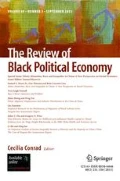Abstract
The following is an extract from our book Seeing White: An Introduction to White Privilege and Race (Halley et al. 2011). The book presents an exploration of the culture of whiteness that dominates social and economic life in the United States. This extract contains a brief introduction to whiteness as a cultural norm and presents the argument that whiteness itself has become a form of economic capital supporting the reproduction of dominance and intergroup inequality. We specifically look at the influence of normative whiteness on hiring decisions and employment structures.
Similar content being viewed by others
Notes
Although we prefer Latina/os as a more inclusive term that avoids a focus on European connection, we use the term Hispanic when referring to Current Population Survey data and other research which have used that term to classify individuals.
References
Bates T. Race, self-employment, and upward mobility: An illusive dream. Washington D.C.: Woodrow Wilson Center Press; Baltimore: Johns Hopkins University Press; 1997.
Bradbury K, Katz J. “Trends in U.S. family income mobility 1967–2004”, Federal reserve bank of Boston Working Paper Series, no. 09–7 (2009), www.bos.frb.org/economic/wp/wp2009/wp0907.pdf (September 10, 2009).
Corak M. “Do poor children become poor adults? Lessons from a cross country comparison of generational earnings mobility”, IZA Discussion Paper, no. 1993. Bonn: Institute for the Study of Labor; 2006.
Darity Jr W. Stratification economics: the role of intergroup inequality. J Econ Financ. 2005;29(2):144–53.
Darley JM, Gross PH. A hypothesis-confirming bias in labeling effects. J Pers Soc Psychol. 1983;44(1):20–33.
Ehrenreich B, Hochschild AR. Global woman: Nannies, maids and sex workers in the new economy. New York: Henry Holt & Company LLC; 2002. p. 16.
England P. Separative and soluble selves. In: Ferber MA, Nelson JA, editors. Feminist economics today: Beyond economic man. Chicago: University of Chicago Press; 2003. p. 34.
England P, Budig M, Folbre N. Wages of virtue: the relative pay of care work. Soc Probl. 2002;49(4):455–73.
Figart D, Mutari E, Power M. Living wages, equal wages: Gender and labor market policies in the United States. Routledge: New York; 2002. p. 17.
Goldsmith AH, Hamilton D, Darity Jr W. From dark to light: skin color and wages among African Americans. J Hum Resour. 2007;42(4):701–38.
Halley J, Eshleman A, Ramya M V. Seeing White: An introduction to white privilege and race. Rowman Littlefield: Lanham, MD; 2011.
Haskins R, Issacs J, Sawhill I. Getting ahead or losing ground: Economic mobility in America. Washington: Brookings Institution Press; 2008.
Jäntti M, Bratsberg B, Roed K, Raaum O, Naylor R, Osterbacka E, Bjorklund A, Eriksson T. “American exceptionalism in a new light: A comparison of intergenerational earnings mobility in the Nordic countries, the United Kingdom and the United States”, IZA Discussion Paper, no. 1938. Bonn: Institute for the Study of Labor; 2006.
Marsh K, Salter D. The emerging black middle class: single and living alone. Social Forces. 2007;86(2):735–62.
McNamee SJ, Miller RK Jr. “The Meritocracy Myth”, Sociation today 2, no. 1 (2004), www.ncsociology.org/sociationtoday/v21/merit.htm (July 15, 2010).
Merton RK. Social theory and social structure. New York: Free Press; 1957.
Pew Research Report. The lost decade of the middle class. Washington: Pew Research Center; 2012.
Roediger D. Wages of whiteness: Race and the making of the American working class, Revised Edition. London: Verso; 1991.
Saez E. “Striking it Richer: The evolution of top incomes in the United States.” http://elsa.berkeley.edu/~saez/saez-UStopincomes-2008.pdf (August 15, 2009).
Snyder M, Tanke ED, Berscheid E. Social perception and interpersonal behavior. J Pers Soc Psychol. 1977;35(9):656–66.
Spero SD, Harris AL. The black worker: The negro and the labor movement. New York: Columbia University Press; 1931.
Stiglitz J. “Information and the change in the paradigm in economics” (Noble Prize Lecture, December 8, 2001), http://nobelprize.org/nobel_prizes/economics/laureates/2001/stiglitz-lecture.pdf.
Strassman D. Not a free market: The rhetoric of disciplinary authority in economics. In: Ferber MA, Nelson JA, editors. Beyond economic man: Feminist theory and economics. Chicago: University of Chicago Press; 1993.
U.S. Census Bureau, 2007 American Community Survey.
U.S. Census Bureau, Fourteenth census of the United States taken in the year 1920 volume IV, occupations, www2.census.gov/prod2/decennial/documents/41084484v4_TOC.pdf.
Word CO, Zanna MP, Cooper J. The nonverbal mediation of self-fulfilling prophecies in interracial interaction. J Exp Soc Psychol. 1974;10(2):109–20.
Wright EO. Classes. London: Verso; 1985.
Author information
Authors and Affiliations
Corresponding author
About this article
Cite this article
Vijaya, R.M., Eshleman, A. & Halley, J. The Culture of Class and Its Economic Impact. Rev Black Polit Econ 42, 7–18 (2015). https://doi.org/10.1007/s12114-014-9176-z
Published:
Issue Date:
DOI: https://doi.org/10.1007/s12114-014-9176-z




